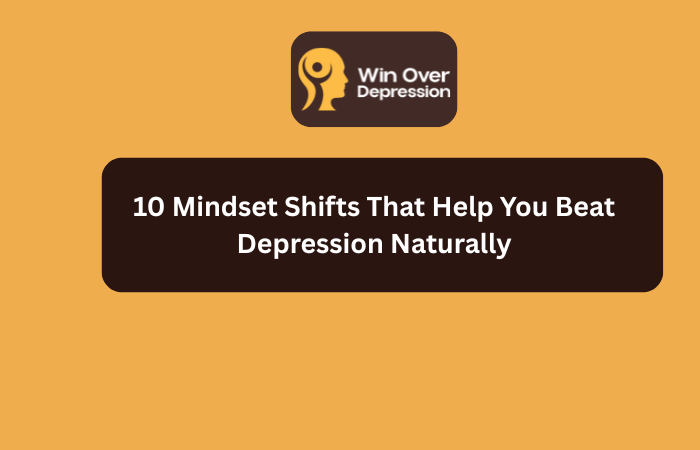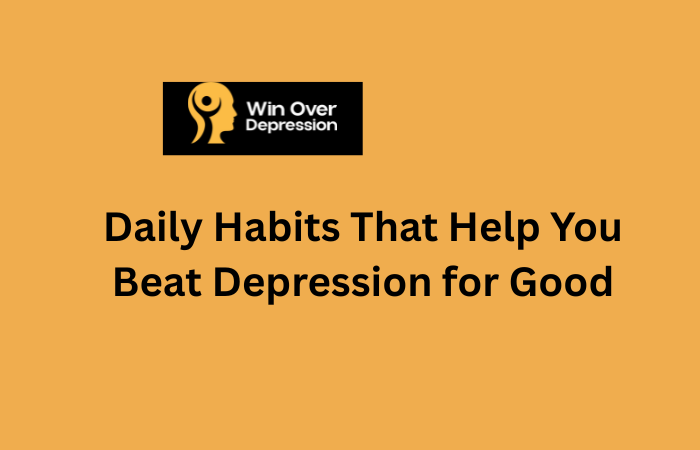Why Mindset Matters in Beating Depression?
Depression can feel like a heavy cloud that never lifts — draining your energy, clouding your judgment, and stealing the joy from your everyday life.
While therapy and medication can be important tools, many people overlook one of the most powerful healing forces they already have: their mindset.
Your mindset is how you think, perceive, and respond to the world. It shapes your emotions, actions, and even your biology.
When you’re depressed, your mindset often shifts into survival mode everything feels harder, darker, and more hopeless. But the good news? Just as your mind adapted to darkness, it can be retrained to seek light again.
In this guide, you’ll discover 10 powerful mindset shifts that can help you beat depression naturally. These aren’t quick fixes or toxic positivity. They’re rooted in psychology, self-awareness, and personal growth — all designed to help you feel stronger, clearer, and more in control of your emotions.
Let’s begin.
Mindset Shift #1: From “I’m Broken” to “I’m Healing”

One of the most damaging beliefs depression can create is the idea that you’re broken or beyond repair. This thought reinforces shame, self-loathing, and hopelessness. But what if you started believing something different — something truer?
Replace “I’m broken” with “I’m healing.”
This small change in language can make a massive difference in how you view yourself. Healing isn’t linear. Some days will be tough. Others will surprise you with peace. But by choosing to view yourself as in progress, you give yourself permission to grow.
Why it matters:
Believing you’re healing gives you hope. Hope leads to action. And action, even small steps, is what fuels recovery.
“You are not broken. You are becoming.”
Try this:
-
Keep a daily “healing journal.” Write down one thing each day that shows progress, even if it’s just getting out of bed.
-
Surround yourself with positive stories of people who have healed. It reminds you that healing is possible for you too.
Mindset Shift #2: From “I Have No Control” to “I Can Choose My Response
Depression makes everything feel out of your hands — your thoughts, emotions, and even your daily life. You may feel like a prisoner inside your own mind. But even in the darkest moments, there is one thing you always control: how you respond.
The shift: Instead of believing “I have no control,” begin to remind yourself:
“I can’t control everything, but I can choose how I respond.”
This isn’t about blaming yourself for how you feel. It’s about taking back your power. Your thoughts and emotions are not your enemy — they’re messages. And you can choose what you do with them.
Why it matters:
This shift helps reduce the helplessness that feeds depression. You are not a passive victim. You are an active participant in your healing journey.
Try this:
-
When a negative thought arises, pause. Ask: Is this thought helpful? Is it 100% true?
-
Practice replacing reactive thoughts with intentional responses. Example: Instead of “I failed again,” try “That didn’t work, but I’m learning.”
Mindset Shift #3: From “I’m Always Going to Feel This Way” to “This Is Temporary”
When you’re deep in depression, time distorts. A single painful moment can feel endless. You begin to believe that how you feel now is how you’ll always feel. But emotions — even the darkest ones — are temporary. They come in waves, and every wave eventually breaks.
The shift: Instead of “This will never end,” say to yourself:
“This feeling is temporary, not permanent.”
Think of depression as a storm. Some storms are fierce and long, but none last forever. Clouds give way to sunlight — always.
Why it matters:
Believing your emotions are permanent keeps you stuck. But knowing they are temporary gives you strength to keep going, even when it’s hard.
“This too shall pass” isn’t just a cliché — it’s a mindset that can anchor you during emotional chaos.
Try this:
-
Write this phrase somewhere visible: “Feelings are visitors — not permanent residents.”
-
When a dark thought arrives, visualize it like a passing cloud. Don’t hold on. Let it float.
Mindset Shift #4: From “I Have to Do This Alone” to “I’m Allowed to Ask for Support”
Depression often convinces you that you’re a burden. That no one understands. That you should “be strong” and handle it by yourself. But isolation only deepens the pain.
The truth? Healing is not meant to be a solo mission.
The shift: Instead of thinking “I have to do this on my own,” remind yourself:
“Asking for support is strength, not weakness.”
Whether it’s a therapist, a close friend, a support group, or even a stranger online — connection is a powerful antidote to depression.
Why it matters:
Connection brings perspective. It reminds you that you’re not alone, that others have walked this path and found light. Depression lies to you — support tells you the truth.
Try this:
-
Text a friend or family member, even just to say hello. Start small.
-
Join a mental health forum or online community — sometimes it’s easier to open up to people who’ve been there.
-
Consider saying this out loud (or writing it): “I need help, and that’s okay.”
You don’t have to scream for help. Even a whisper is enough to begin healing.
Mindset Shift #5: From “I Need to Fix Everything” to “Small Steps Are Enough”
When you’re depressed, the idea of fixing your entire life feels overwhelming. You might think: “I need to get a new job, rebuild my relationships, fix my body, be happy… all at once.” That pressure can be crushing.
Here’s the truth: you don’t have to fix everything. You just have to take the next small step.
The shift: Replace “I need to fix my whole life” with:
“I will take one small step today, and that is enough.”
Healing isn’t about perfection or massive change overnight. It’s about gentle progress. Even brushing your teeth, taking a short walk, or drinking water can be victories in recovery.
Why it matters:
Focusing on small wins builds momentum. When you feel successful in something tiny, your brain rewards you with motivation to do more. That’s how healing grows.
“You don’t climb a mountain in one leap. You take one step, then another.”
Try this:
-
Each morning, write down one small goal: Take a shower. Stretch for 3 minutes. Eat breakfast.
-
Celebrate when you complete it. Acknowledge that it matters. Because it does.
-
Use a habit tracker or journal to remind yourself: small steps lead to big changes.
Mindset Shift #6: From “I’m Not Making Progress” to “Healing Is Non-Linear”
Depression recovery isn’t a straight line. Some days you’ll feel strong and clear. Other days you’ll feel like you’re back where you started. That doesn’t mean you’ve failed — it means you’re human.
The shift: Instead of “Why am I feeling this way again?” shift to:
“Healing isn’t linear. Setbacks are part of the process.”
Just like physical wounds scab, itch, or reopen a little before they fully heal, emotional wounds also take time. Expecting constant improvement can lead to disappointment. But expecting waves helps you ride through them.
Why it matters:
This shift takes pressure off you to always “feel better.” It gives you space to honor your process — even the messy parts — without judgment.
Try this:
-
Track your moods weekly, not daily. You’ll notice trends and growth over time.
-
When you have a rough day, remind yourself: “This is part of healing, not the end of it.”
-
Speak kindly to yourself during setbacks. Imagine what you’d say to a friend — and say it to yourself.
One step back does not erase ten steps forward.
Mindset Shift #7: From “My Emotions Are the Enemy” to “My Emotions Are Messengers”
When you’re depressed, emotions like sadness, anger, fear, and guilt can feel unbearable. You might wish they’d just disappear. But trying to suppress emotions often makes them louder and more destructive.
What if, instead of fearing your feelings, you started listening to them?
The shift: Move from “I hate feeling like this” to:
“My emotions are trying to tell me something.”
Emotions aren’t problems — they’re information. Sadness might be asking you to slow down. Anger might be pointing to an unmet need. Numbness could signal emotional burnout. Once you stop fighting them, emotions become guides — not enemies.
Why it matters:
Listening to your emotions helps you respond with compassion rather than avoidance. This deepens healing and helps you reconnect with yourself.
“Your emotions are not in the way — they show you the way.”
Try this:
-
When you feel overwhelmed, pause and ask: What is this feeling trying to tell me?
-
Label your emotion clearly: “This is sadness.” “This is fear.” Naming it helps calm your brain.
-
Write your emotions a letter. Let them speak without judgment.
Mindset Shift #8: From “I’m Weak for Feeling This Way” to “It’s Okay to Not Be Okay”
In a world that praises strength, productivity, and constant positivity, admitting that you’re struggling can feel like failure. But vulnerability isn’t weakness — it’s honesty. And honesty is the foundation of healing.
The shift: Instead of “I should be stronger,” remind yourself:
“Feeling this way doesn’t make me weak. It makes me human.”
It’s okay to cry. It’s okay to feel tired. It’s okay to admit you’re not okay. Accepting your current emotional state is the first step toward transforming it.
Why it matters:
Self-shaming blocks healing. Self-acceptance opens the door to compassion — and real change. You don’t need to be perfect. You just need to be real.
“You don’t need to be ‘better.’ You just need to be you — exactly as you are.”
Try this:
-
Replace self-critical thoughts with gentle ones: “I’m doing the best I can right now.”
-
Allow yourself rest. Healing isn’t lazy — it’s essential.
-
Talk to yourself as you would talk to a hurting friend. With patience. With love.
Mindset Shift #9: From “I’ll Be Happy When…” to “I Can Choose Joy in Small Moments”
When you’re depressed, it’s common to postpone happiness. You might tell yourself, “I’ll feel better once I get a job, lose weight, move away, or fix my relationships.” But pinning your happiness to future events only extends your suffering.
The shift: Let go of “I’ll be happy when…” and begin to believe:
“I can find joy in small, everyday moments — even during healing.”
This isn’t about pretending everything’s fine. It’s about noticing and appreciating tiny moments of peace, beauty, or comfort. Joy doesn’t need to be earned — it can be experienced in the now, no matter what else is going on.
Why it matters:
Finding small sparks of joy builds emotional resilience. It reminds your brain and body that life can still feel good — and that feeling better is possible.
“Joy is not the absence of pain, but the presence of light — even in the dark.”
Try this:
-
Start a “joy list” of little things that lift your mood: a warm cup of tea, sunlight on your face, a favorite song.
-
Each evening, reflect on one moment of calm, peace, or comfort from your day.
-
Practice mindfulness — be fully present during ordinary moments like brushing your teeth or eating.
Mindset Shift #10: From “I’ll Never Change” to “I’m Capable of Growth”
One of the deepest lies depression tells you is that you’re stuck — that no matter what you do, you’ll always feel this way. But this couldn’t be further from the truth. The human mind is incredibly adaptable. You can grow. You can heal. You can change.
The shift: Instead of “This is just who I am,” remind yourself:
“I may not be where I want to be yet, but I’m growing every day.”
Growth isn’t about massive transformations. It’s about becoming more in tune with yourself, building inner strength, and allowing new beliefs to take root.
Why it matters:
Believing in your capacity to grow gives you direction, motivation, and purpose. It replaces hopelessness with possibility — a key ingredient in healing.
“You are not stuck. You are becoming.”
Try this:
-
Celebrate personal wins, even if they feel small. Progress is progress.
-
Reflect on how far you’ve come, not just how far you have to go.
-
Read stories of people who have transformed after depression — let their growth inspire yours.
Conclusion: You Are More Powerful Than You Think
Healing from depression naturally doesn’t mean doing it all on your own. It means tuning in, rewriting inner beliefs, and practicing daily shifts that empower you — not punish you.
These 10 mindset shifts are not just tools — they are gentle truths you can carry with you:
-
You are healing, not broken.
-
You can choose your response, even in hard moments.
-
Your emotions are temporary.
-
You’re allowed to ask for help.
-
Small steps are powerful.
-
Healing is not a straight line.
-
Your emotions are teachers, not enemies.
-
Vulnerability is strength.
-
Joy exists in small moments.
-
You are capable of change.
You don’t need to feel better overnight. You only need to begin thinking in a way that supports your healing. That’s how you win over depression — one honest, compassionate thought at a time.
The light you’re seeking isn’t out there. It’s within you — waiting to be reignited.



